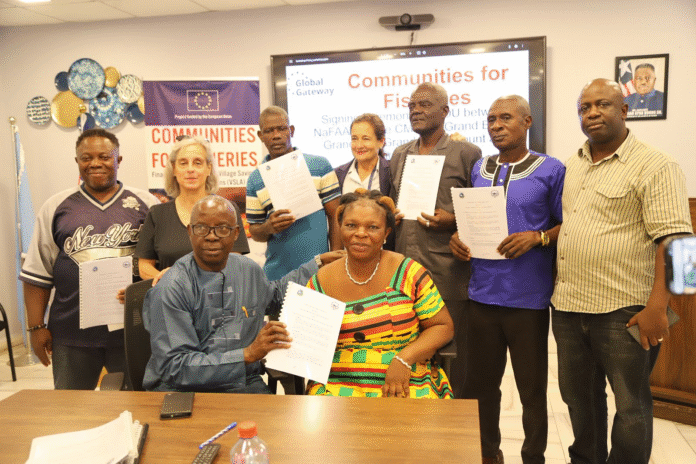A new report from the Environmental Justice Foundation (EJF) has revealed how Liberia’s Collaborative Management Associations (CMAs) are reshaping fisheries governance and giving coastal communities a stronger role in protecting the marine resources on which they depend.
The findings draw on lessons from the Communities for Fisheries project, an EU-funded initiative implemented by EJF in partnership with the National Fisheries and Aquaculture Authority (NaFAA) between December 2019 and July 2025.
Small-scale fisheries are central to Liberia’s food security and economy, supporting over 75,000 people including fishers, processors, traders, boat builders, and traditional leaders. However, the sector continues to face major threats from illegal, unreported, and unregulated (IUU) fishing, overexploitation, and the growing pressures of climate change.
In response, Liberia introduced a co-management model in 2012, empowering local communities to work alongside government in managing marine resources. The Communities for Fisheries project built on this foundation by establishing seven new CMAs in Grand Cape Mount, Margibi, Grand Bassa, and Grand Kru counties—bringing the national total to nine. These associations, which operate as democratic, community-led institutions, allow fishers and other stakeholders to collaborate with NaFAA to monitor, manage, and safeguard fisheries.
The project also secured a policy framework to guide future governance, including Liberia’s first-ever National CMA Policy and Strategy and a Memorandum of Understanding between NaFAA and all CMAs. These steps embed co-management into national law and ensure communities remain central to protecting the country’s oceans.
Steve Trent, CEO and Founder of EJF, said the report demonstrates how co-management can deliver tangible results. “When fishers and authorities work together, they can make decisive progress towards sustainable fisheries. These lessons are vital for Liberia and other countries in the region facing similar challenges,” he said.
The report highlights both achievements and challenges of the process. Community sensitisation, leadership elections, and formal induction of officers were key milestones in forming CMAs. At the same time, limited resources and the need for ongoing capacity-building remain hurdles. Still, the initiative has led to stronger community participation, greater transparency, and improved enforcement against illegal fishing.
EJF believes Liberia’s example provides a roadmap for other nations in West Africa and beyond. With small-scale fisheries forming the backbone of food security across the region, the report argues that supporting local leadership and embedding community co-management into policy can ensure both resilient oceans and resilient communities.
The publication further recommends steps for successful replication elsewhere, from inclusive consultations to continuous training and formal recognition of CMAs.
Funded by the European Union, the Communities for Fisheries project underscores that local communities, when backed by strong institutions and policies, can lead the way in building sustainable futures for fisheries, coastal livelihoods, and national food security.



